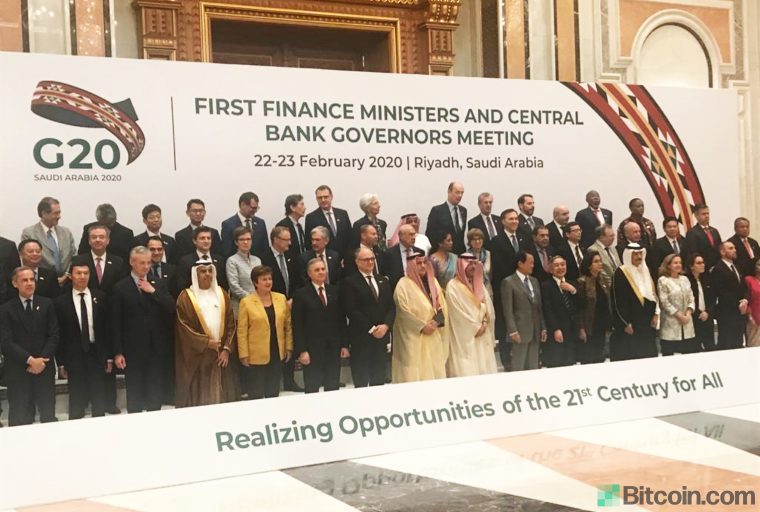Cryptocurrencies and stablecoins, such as Facebook’s planned project Libra, were discussed at the first G20 Finance Ministers and Central Bank Governors Meeting that took place in Riyadh, Saudi Arabia, on Feb. 22 and 23.
In the G20 Communique released after the second day of the meeting, the finance chiefs explained that “global economic growth is expected to pick up modestly in 2020 and 2021.” However, they added, “We will enhance global risk monitoring, including of the recent outbreak of COVID-19 [coronavirus disease],” noting that “downside risks to the outlook persist.” Regarding cryptocurrencies, their statement reads:
Building on the 2019 Leaders’ Declaration, we urge countries to implement the recently adopted Financial Action Task Force (FATF) standards on virtual assets and related providers.
In June last year, the G20 leaders met in Osaka, Japan, and declared their commitments to following the standards for crypto assets and related service providers set by the FATF. By October, the FATF had already begun evaluating how well countries were implementing their recommendations.
In their Feb. 23 statement, the G20 finance ministers and central bank governors also addressed the subject of stablecoins. They wrote:
We reiterate our statement in October 2019 regarding the so-called ‘global stablecoins’ and other similar arrangements that such risks need to be evaluated and appropriately addressed before they commence operation, and support the FSB’s efforts to develop regulatory recommendations with respect to these arrangements.
The G20 is expecting reports on cryptocurrencies and stablecoins from a few global standard-setting bodies, including the Financial Stability Board (FSB), the International Monetary Fund (IMF), and the FATF.
The G20 refers to stablecoins with the potential to achieve scale at launch as global stablecoins, an example of which is Facebook’s Libra. In a recent hearing before the House of Representatives Committee on Financial Services with Federal Reserve Chairman Jerome Powell, it was mentioned that another entity in a position to achieve similar scale is the Chinese government. Powell was therefore urged to work on the digital dollar to be able to quickly respond to the digital yuan rollout.
Following the leaders’ summit in Japan last year, the G20 issued a press release in October on global stablecoins. Their statement reads:
While acknowledging the potential benefits of financial innovation, we agree that global stablecoins and other similar arrangements with potential systemic footprints give rise to a set of serious public policy and regulatory risks.
“Such risks, including in particular those related to money laundering, illicit finance, and consumer and investor protection, need to be evaluated and appropriately addressed before these projects can commence operation,” the statement concludes. The chairman of the FSB also sent a letter to the G20 finance chiefs ahead of their October meeting regarding stablecoins.

